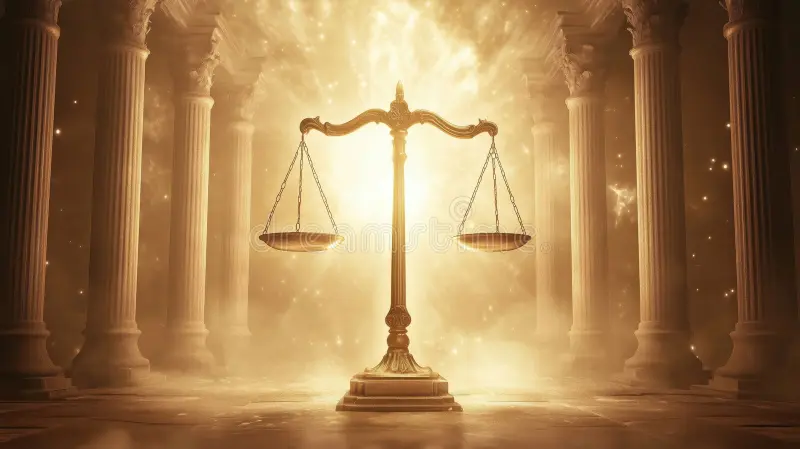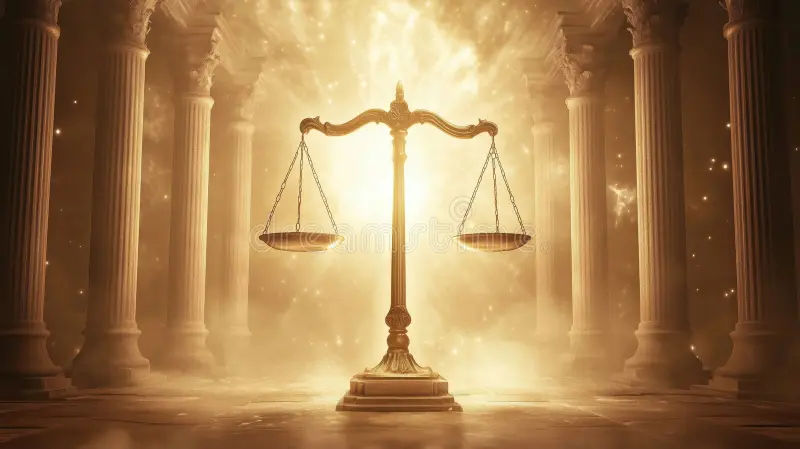Table of Contents


The Divine Court: An Introduction
The term “Divine Court” refers to the belief that God (or a transcendent power) serves as the ultimate judge of human actions, thoughts, and intentions — rewarding virtue and punishing sin. This idea is widespread across religions, philosophies, and cultural traditions. In this essay, we will explore the historical, religious, philosophical, social, psychological, and contemporary aspects of the concept of the Divine Court.
Historical and Cultural Background
In ancient societies, the idea of divine justice shaped moral discipline and social harmony.
Different traditions expressed it differently — as gods, ancestral spirits, heavenly judges, or the “Final Judgment Day.”
Folklore, epics, and scriptures often describe scenes of divine judgment to instill moral values and guide behavior.
Religious and Scriptural Perspectives
Hindu Tradition
Hindu philosophy emphasizes the law of karma and rebirth. Every action has consequences, and the soul must face the results of its deeds.
Symbolic figures include Yamaraj (Lord of Death) and Chitragupta (the cosmic record-keeper of deeds).
The Divine Court is understood as the moral mechanism of rebirth and liberation (moksha), not just punishment but also purification and ultimate freedom.
Islamic Perspective
Islam emphasizes the Day of Judgment (Qiyamah), when Allah will judge all beings.
Human deeds will be weighed, and paradise or hell will be assigned accordingly.
Divine judgment combines absolute justice with divine mercy.
Christian Tradition
Christianity speaks of the Final Judgment, when God will reveal and judge the deeds of all humanity.
Eternal reward or punishment depends on faith, repentance, and deeds.
Buddhism and Other Traditions
Buddhism stresses karma and cause-effect rather than a divine judge. Actions naturally lead to consequences in future lives.
Indigenous traditions often interpret judgment as being carried out by spirits, ancestors, or natural forces.
Philosophical Dimensions
Moral Responsibility: The Divine Court emphasizes that no action is without consequence.
Justice vs. Mercy: Philosophers debate whether divine judgment is purely just or also compassionate.
Fear vs. Inner Morality: Is goodness motivated by fear of divine judgment, or by intrinsic ethical understanding? Many traditions see the Divine Court as a way to strengthen both.
Legal and Social Comparison
Earthly Courts vs. Divine Court
Earthly courts: rely on evidence, law, and procedure.
Divine Court: ultimate and universal, based on complete knowledge of all actions.
Social Control: Where human law fails, belief in divine justice maintains moral order.
Criticism: Over-reliance on “justice in the afterlife” can sometimes delay urgent reforms in human justice systems.
Literary and Cultural Representations
Stories, poetry, and dramas often portray the Divine Court as the stage where truth prevails.
Modern films and literature also explore the theme — criminals haunted by conscience, victims awaiting divine justice, or society grappling with morality.
Psychological and Personal Meaning
Self-examination: The belief encourages constant reflection — “Are my deeds justifiable?”
Mental Health: Excessive guilt may be worsened by fear of divine punishment, while balanced faith can provide comfort and motivation.
Hope and Consolation: For victims of injustice, the belief that ultimate justice awaits can be a source of peace.
Contemporary Relevance and Criticism
Moral Education: Still used in teaching ethics and shaping religious values.
Politics and Society: Sometimes leaders misuse the concept to avoid accountability (“God will judge me, not humans”).
Modern Debate: Human rights advocates question whether relying on divine justice hinders real-time justice in society.
Ethical and Practical Insights
Personal Responsibility: The Divine Court should inspire self-discipline and good conduct, not only fear.
Judicial Reform: Belief in divine justice should complement, not replace, a fair and transparent human legal system.
Mental Balance: Healthy spirituality should avoid excessive guilt while encouraging moral growth.
Conclusion
The Divine Court is a multi-layered concept touching religion, philosophy, law, society, psychology, and culture. Its positive side is that it inspires morality, comforts the oppressed, and strengthens long-term responsibility. However, it can also be misused as an excuse for injustice or blind fear. Ultimately, the idea of a Divine Court reminds humanity that actions matter beyond immediate gain — true justice, whether divine or human, lies in accountability, compassion, and ethical living.
The Divine Court and the Court of Nature
Introduction
Since the dawn of civilization, humanity has perceived justice, accountability, and consequences through two great lenses. The first is the Divine Court, where God, deities, or higher powers are believed to evaluate human actions and intentions. The second is the Court of Nature, where natural laws, ecological balance, and the cause-effect principle determine the outcomes of human behavior. These two “courts” are not merely metaphors; they shape moral conduct, social order, and environmental decisions.
The Divine Court — Concept and Characteristics
Definition: The Divine Court refers to the belief that human deeds, thoughts, and intentions are overseen by a higher spiritual authority, which ultimately rewards or punishes them.
Core Features:
Moral-Spiritual Standards: Scriptures, prayers, rituals, and ethical codes act as measures of human conduct.
Karma Doctrine: Every action has consequences — “कर्मण्येवाधिकारस्ते मा फलेषु कदाचन” (Bhagavad Gita 2.47).
Afterlife and Rebirth: Many traditions emphasize accountability after death, where the soul undergoes judgment.
Mercy and Forgiveness: Divine justice often includes grace, forgiveness, and opportunities for redemption.
Rituals of Atonement: Practices such as prayer, sacrifice, or penance are believed to mitigate sins.
Strengths and Limitations: The Divine Court provides moral discipline and hope but may also be misused in the form of superstition or dogma.
The Court of Nature — Concept and Characteristics
Definition: The Court of Nature refers to the inherent laws of the universe — biological, ecological, and physical — where every cause produces an inevitable effect, independent of belief or faith.
Core Features:
Cause and Effect: Natural outcomes follow actions directly — poor farming depletes soil, pollution triggers climate change.
Impartial Justice: Nature’s justice is not emotional; it is factual and objective.
Ecological Balance: Biodiversity, food chains, and climate cycles enforce natural checks and balances.
No Forgiveness: Unlike divine grace, nature never pardons — it reacts strictly according to its rules.
Human Vulnerability: Natural justice is evident in disasters, disease outbreaks, and resource depletion caused by human neglect.
Strengths and Limitations: Natural justice is precise and impartial, but often slow or unrecognized until damage becomes irreversible.
Comparison — Divine vs. Natural Court
Basis: Divine — spiritual and moral; Natural — scientific and ecological.
Nature of Justice: Divine — with mercy, based on sin and virtue; Natural — impartial, rooted in cause and effect.
Timeframe: Divine justice may occur in this life or afterlife; Natural justice is immediate or long-term within worldly systems.
Possibility of Alteration: Divine justice may be softened through prayer or repentance; Natural justice changes only through corrective actions.
Purpose for Humanity: Both guide human behavior — one through moral faith, the other through tangible results.
Philosophical and Religious Perspectives
In Hinduism, karma encompasses both divine and natural courts: actions yield inevitable results (natural law), while deities guide and oversee the moral path (divine law).
Buddhism emphasizes natural causation (dependent origination) with less focus on divine judgment.
Christianity and Islam emphasize divine accountability in the afterlife, yet environmental stewardship reflects the natural court.
Socio-Moral Implications
Law and Punishment: Legal systems borrow from both — divine morality (justice, ethics) and natural evidence (cause-effect proof).
Personal Transformation: The Divine Court nurtures guilt, conscience, and repentance; the Natural Court enforces behavior change through consequences.
Moral Debates: Sometimes religious teachings approve an action, but nature shows harmful results — both perspectives must balance.
Environmental and Modern Relevance (Rise of the Court of Nature)
Industrialization, consumerism, and unsustainable growth have intensified the Court of Nature’s warnings: climate change, biodiversity loss, and public health crises. Here, divine morality (ethical responsibility) and natural science (factual evidence) must work together. For example, religious values can inspire care for creation, while scientific policy enforces sustainable practices.
Practical Guidance — Living with Both Courts
Follow Duty with Integrity: Inspired by the Gita, perform righteous action without attachment to results.
Respect Scientific Knowledge: Acknowledge natural evidence and live sustainably.
Balance Morality and Responsibility: Let faith shape ethics, and let science guide action.
Environmental Consciousness: Practice eco-friendly habits such as conservation, recycling, and reforestation.
Strengthen Social Justice Systems: Build laws and education rooted in both ethical and ecological principles.
Cultural and Literary References
Epics like Mahabharata and Ramayana show the interplay of divine justice and karmic consequences.
Folk tales and myths often depict natural justice — for example, farmers neglecting land facing famine.
Conclusion
The Divine Court and the Court of Nature represent two dimensions of justice — one spiritual and moral, the other ecological and factual. While the Divine Court offers guidance, hope, and forgiveness, the Court of Nature enforces unavoidable cause-effect laws. For humanity’s survival, harmony, and sustainability, both must be respected.
Ultimately — live truthfully, act responsibly, honor nature’s laws, and uphold ethical duty. Only then can life be just, balanced, and enduring.


